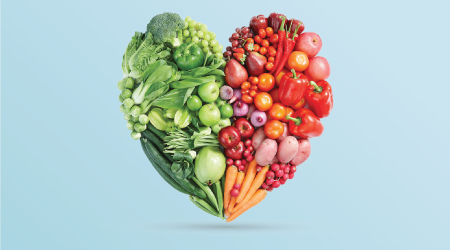A well-balanced vegetarian diet
“You Are What You Eat” an age-old proverb is a true reflection of the power of nutrition. It refers to the fact that food controls a person’s health. Nutrition is an essential component of heart health, vegetarian diet in particular benefits heart health in a number of ways. In this periodical, we wish to bring into your kind notice the cardio-protective benefits of vegetarian diet and explain the reasons as to why non-vegetarian diet is not good for your heart health. A well-balanced vegetarian diet is adequate in every aspect of nutrition be it macronutrients (carbohydrates, protein and fats) or micronutrients (vitamins and minerals). A number of researches have shown that vegetarians are at a lower risk of obesity, high blood pressure and diabetes, all of which are directly linked with the risk of heart disease. Vegetarian diet is rich in dietary fibre and antioxidants which protects the heart from inflammation and damage thereby preventing heart attack. Awell-planned vegetarian diet helps in lowering cholesterol levels and weight management. Vegetarian lifestyle, is a great foundation for a heart healthy diet. At Saaol we emphasize greatly on vegetarianism, as it is an important component to bring the cardiac risk factors to the lowest. All kinds of meats (mutton, pork, beef, ham), poultry, all kinds of fishes are loaded with cholesterol people sometimes get bewildered and end up justifying their non-vegetarian food consumption as a component of their healthy fat intake; however, they tend to overlook the fact that body specifically the liver produces 80-85% of the total cholesterol requirements of the body and the rest is obtained from invisible fats.
vegetarianism has taken the lead over non-vegetarianism
Evidences suggest that vegetarian diets may lead to lower blood pressure, improved cholesterol levels, healthier weight and less incidence of Type 2 Diabetes. Vegetarian diets have lower levels of total fat, saturated fat and cholesterol than meat-based diets. Several cross-sectional studies have shown that vegetarians have significantly lower concentrations of total cholesterol, LDL- cholesterol, and triglycerides compared with non-vegetarians. Vegetarian diets may reduce blood cholesterol concentrations through several mechanisms, they are low in cholesterol, total fat, and saturated fatty acids, leading to less absorption and conversion to blood cholesterol. The phytochemicals present in vegetarian foods exert substantial influence on cholesterol levels via multiple mechanisms. Phytosterols reduce intestinal absorption by competing with cholesterol and preventing its accumulation.
Apart from scientific evidences, the mythological evidences also supports vegetarianism. Major mythological descriptions of various religions suggest that humans were created by God as vegetarian beings, the 7th Adventist stands a great example to it. Our gut, teeth and overall body is designed to adopt vegetarianism, it also keeps our body in equilibrium. Over the years, vegetarianism has taken the lead over non-vegetarianism. People in the west have returned to vegetarianism after being non-vegetarians. We Indians who have a tradition of vegetarianism, supported by religion, are still going, unfortunately, towards non-vegetarianism. We should focus on the health benefits that vegetarian diet offers us.
